El CNB cuenta con un Comité Ético de Experimentación Animal que vela por el cumplimiento de los códigos de buenas prácticas científicas en el centro. Como parte del CSIC, suscribe la declaración de apoyo a la Directiva Europea 2010/63/EU que protege a los animales usados en investigaciones científicas.
El CNB se ha adherido al Acuerdo de Transparencia en Experimentación Animal, lanzado el 20 de septiembre de 2016. El Informe sobre Transparencia Animal resume el progreso en la implementación de este acuerdo.
El CNB tienen un compromiso con la “cultura del cuidado”. Para promover esta cultura del cuidado el CNB-CSIC forma parte del acuerdo de transparencia impulsado por la Confederación de Sociedades Científicas de España (COSCE) y es miembro de la Asociación Europea para la Investigación Animal (EARA).
Para favorecer la transparencia, puede realizar cualquier observación anónima sobre el animalario pudiendo añadir su correo electrónico en el mensaje si desea que enviemos una repuesta. Para dirigirse hasta él basta con pulsar el siguiente enlace.
Desde el Centro Nacional de Biotecnología (CNB) realizamos múltiples investigaciones con las que damos respuestas científicas que mejoran la salud de las personas, de los animales y del medio ambiente. Muchas de estas respuestas no requieren del uso de animales para realizar experimentos, pero en algunos casos su uso es crucial.
En esos casos solo los modelos in vivo nos dan respuestas a enfermedades como el cáncer, las vacunas, el Parkinson o los tratamientos frente a bacterias.
Siempre que se van a utilizar animales en nuestro centro se requiere la autorización previa de la Comunidad de Madrid proporcionada después de una evaluación entre el daño que se puede llegar a producir y el beneficio que se va a obtener, explicada en un proyecto donde se han tenido en cuenta los principios de las 3Rs
Reemplazamiento: buscar y utilizar de forma prioritaria todas aquellas alternativas al uso de animales. Para eso se suministran bases de datos de métodos alternativos
Reducción: se utilizarán el mínimo número de animales que permita contestar las respuestas en los experimentos. Éticamente es inaceptable usar animales sin justificación. El cálculo del tamaño muestral en los experimentos nos permite no utilizar más animales de los necesarios ni tampoco menos de los necesarios. El uso de pocos animales, si no dan respuestas a los experimentos también es éticamente inaceptable.
Refinamiento: el alojamiento, el manejo y todas aquellas técnicas empleadas en experimentación animal deben de minimizar el dolor, sufrimiento y estrés de los animales.
https://www.reprefred.eu/Refinement
El programa Objetivo Planeta de Lorenzo Milá en el Canal 24h de RTVE nos visitó para la realización del programa dedicado a la experimentación animal emitido el día 1 de febrero de 2024. A continuación se encuentra el enlace al programa completo del canal de Youtube
CULTURA DEL CUIDADO
La cultura del cuidado se inicia con un compromiso institucional del Centro Nacional de Biotecnología (CNB) donde se establece que estamos comprometidos con cinco objetivos claros:
- En reemplazar los experimentos con animales y a promover el desarrollo de métodos de investigación sin animales en aquellos casos que sea posible.
- En el caso que sea necesario usar animales llevarlos a cabo cumpliendo los principios de las 3Rs.
- A proporcionar a los comités de supervisión, Organismo de Bienestar Animal (OEBA) del CNB, los recursos necesarios para contribuir a la mejora del cuidado y bienestar animal.
- A proporcionar información fiable a la sociedad para generar mayor conocimiento y comprensión.
- A mejorar el bienestar y la formación del personal que trabaja o usa animales de experimentación.
En el marco de la iniciativa Be Open About Animal Research Day (BOARD 2024) de EARA que tuvo lugar el 3 de mayo de 2024, Angel Naranjo, Verónica Domínguez y Belén Pintado han contribuido con el video:
Estadisticas en Experimentación Animal
A continuación exponemos las estadísticas de animales registrados en el centro
Segundo semestre de 2023
Se puede apreciar en la siguiente gráfica la gran diferencia entre los animales que no han participado en experimentos (80%), pero que sí han sido necesarios para conseguir los 903 animales utilizados en investigación. En el CNB la mayoría de estos animales se utilizan para la investigación de órganos sensoriales (16% del total de los animales) sistema inmunitario (un 4 %) y una mínima parte del sistema nervioso.
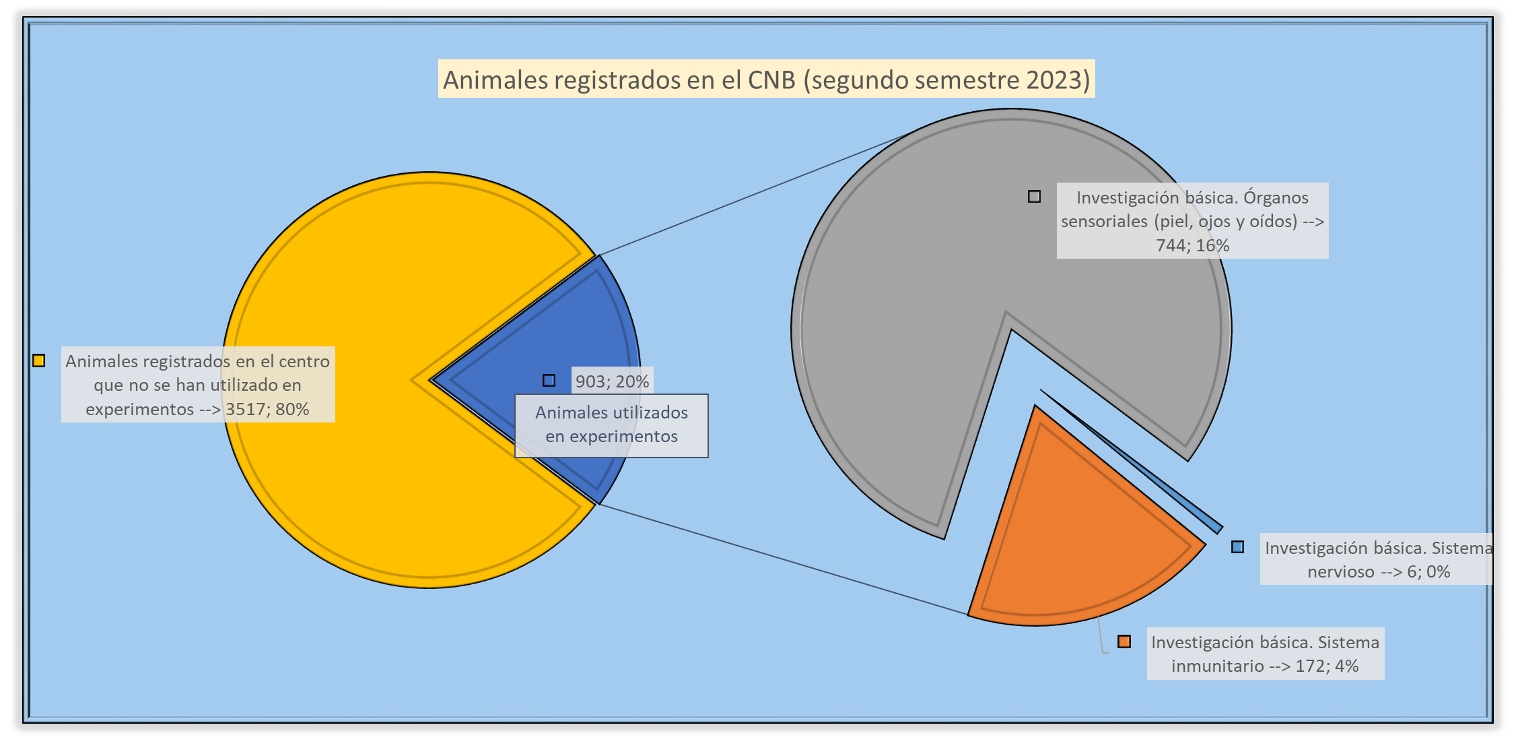
Por otro lado esta gráfica representa el grado de alteración genética de los animales atendiendo a la utilización o no en la investigación.
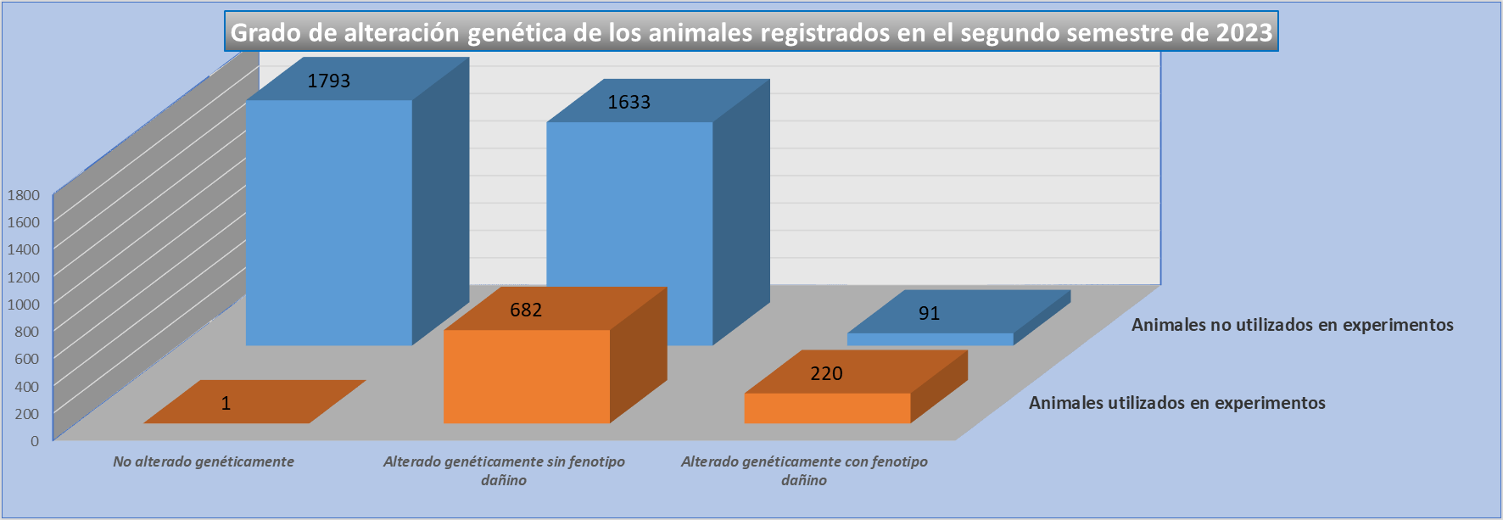
Primer semestre de 2023
La dinámica entre animales utilizados en experimentación y los no utilizados fue muy similar en el semestre anterior, generando 4706 animales que no fueron utilizados en experimentación (supuso un 83% de la totalidad) pero que también sirvieron para desarrollar los proyectos. El número de individuos que sí se utilizaron dentro de proyectos de investigación con animales activos fue de 992 (un 17% del cómputo total).
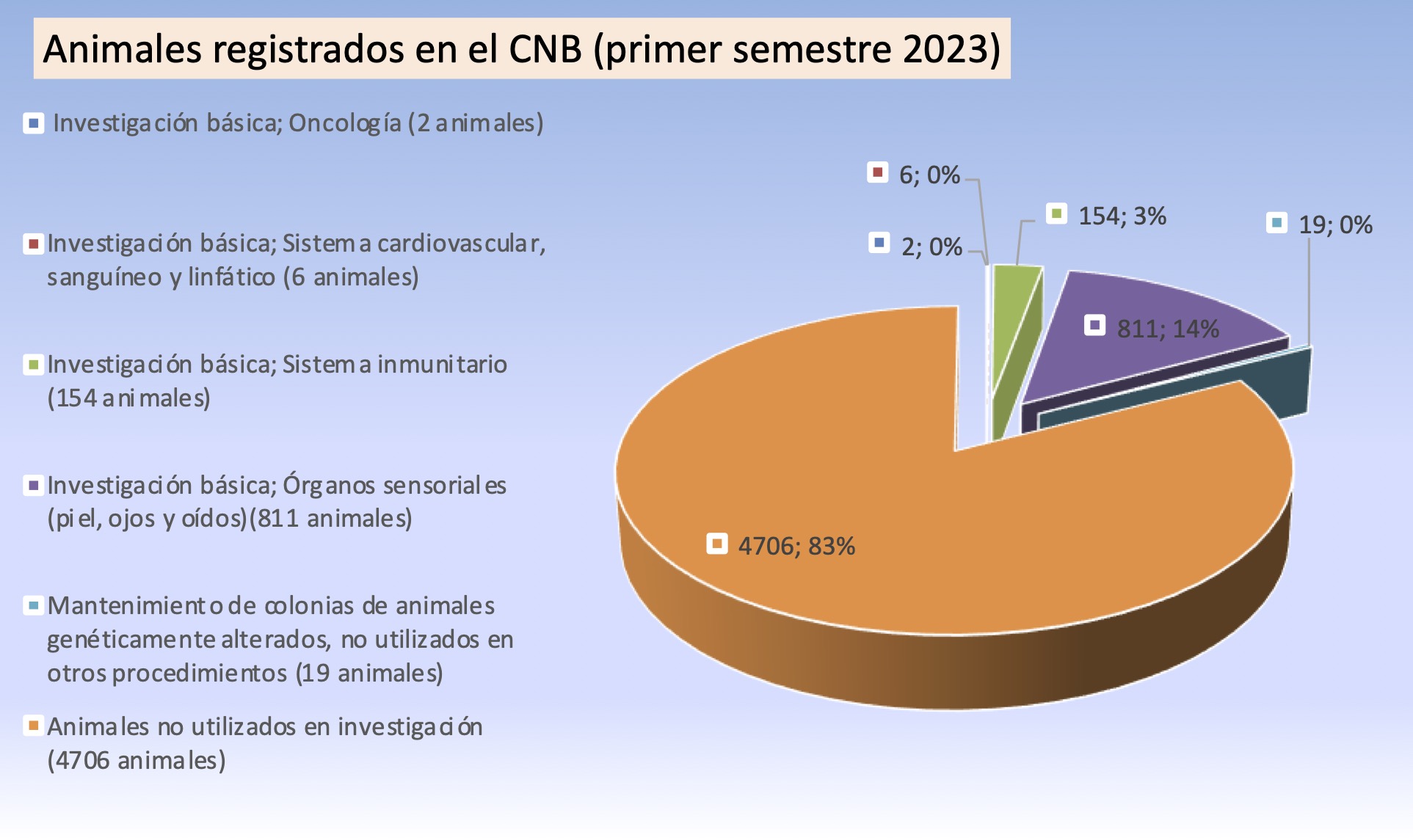
La siguiente gráfica nos da una representación visual de la importancia que adquieren los proyectos de investigación básica dentro del CNB.
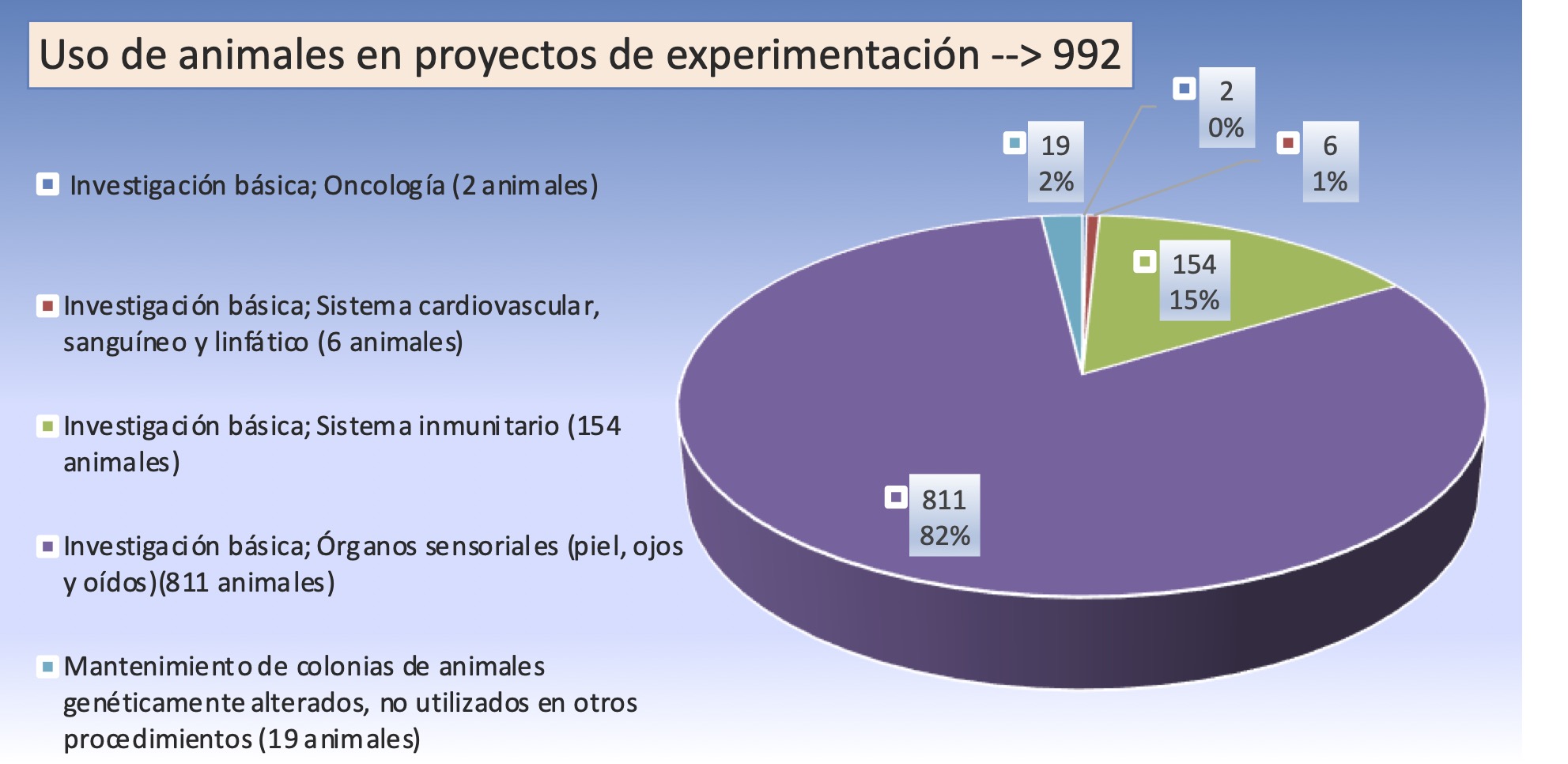
Abarcando todos los animales y teniendo en cuenta si se han utilizado o no en investigación, este es el grado de modificación genética de los individuos.
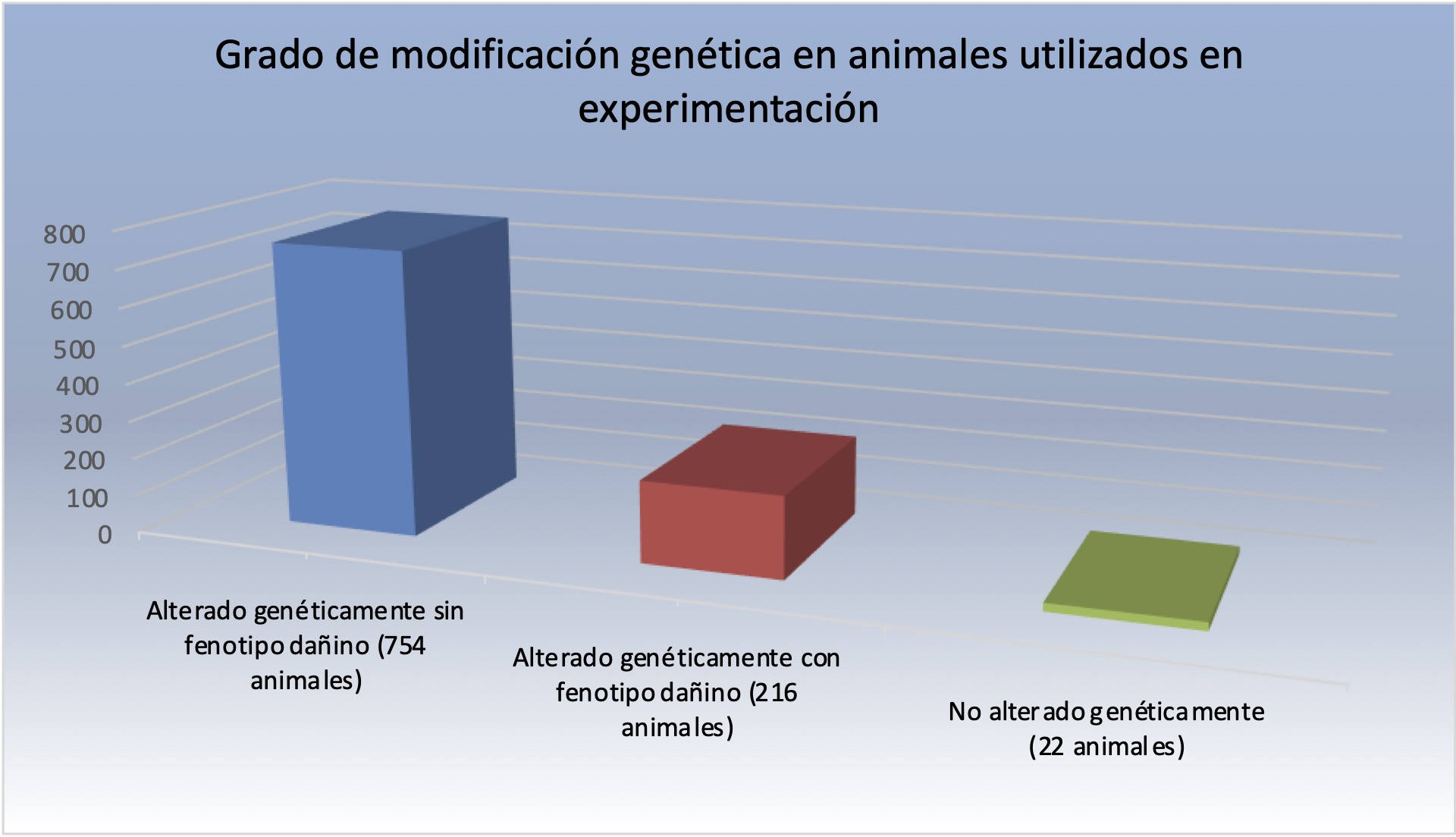
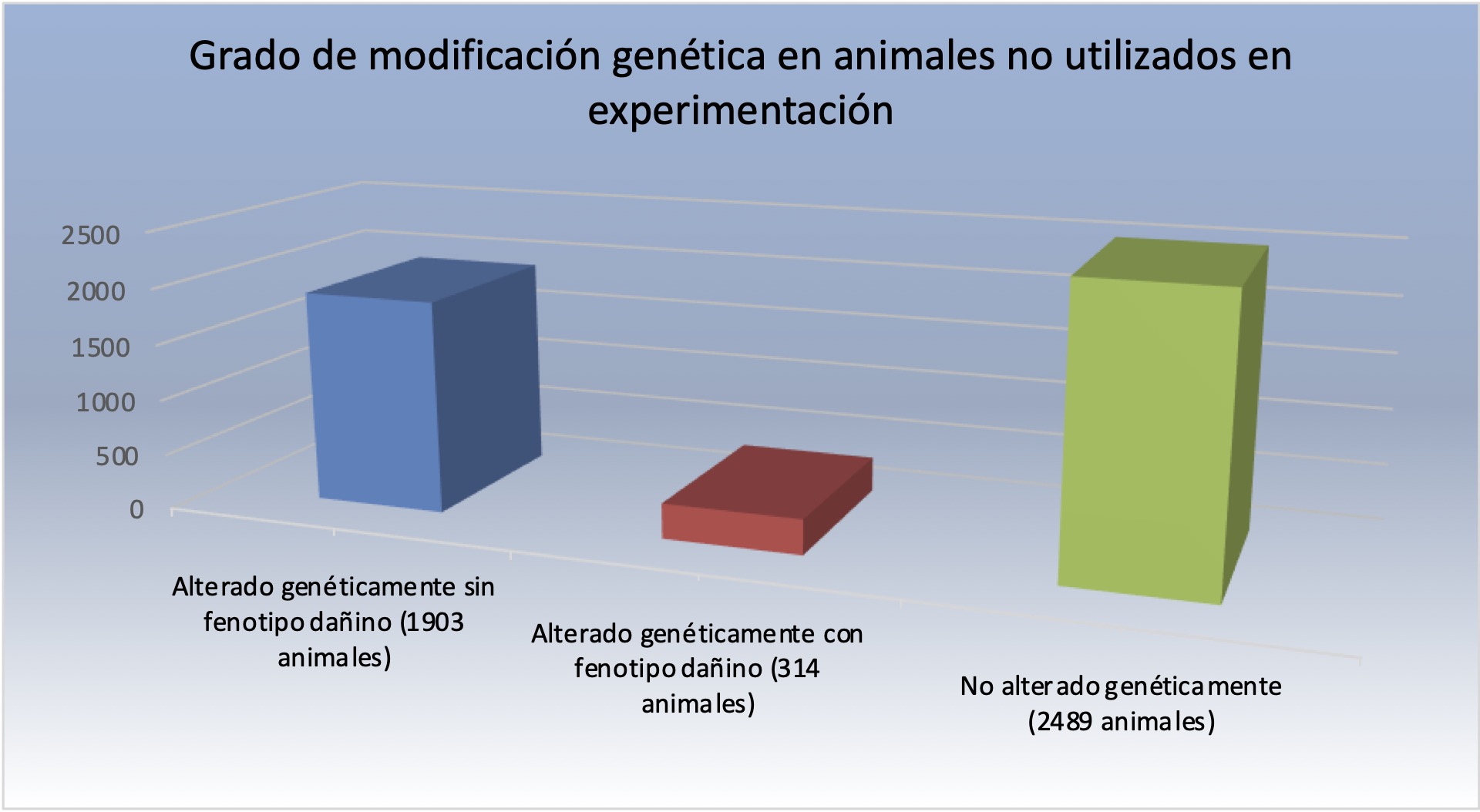
COMITÉ ÉTICO DE EXPERIMENTACIÓN ANIMAL DEL CNB
Página donde se irán recogiendo las informaciones de interés sobre el Comité Ético de Experimentación Animal del Centro Nacional de Biotecnología.
COMITÉ ÉTICO DE EXPERIMENTACIÓN ANIMAL DEL CNB - CSIC
- SEMINARIO INFORMATIVO CEEA-CNB (formato *.pdf)
- PRINCIPALES CAMBIOS DEL RD 53/2013 PARA LOS INVESTIGADORES (formato *.doc)
DOCUMENTACIÓN NECESARIA PARA SOLICITUD DE AUTORIZACIÓN DE PROYECTOS
- SOLICITUD DE CERTIFICADO AL CNB Y EVALUACIÓN AL COMITÉ ÉTICO CSIC (formato* docx.)
- PROPUESTA DE PROYECTO (formato* doc.)
- PLANTILLA DE SOLICITUD DE AUTORIZACIÓN DE PROYECTOS A LA AUTORIDAD COMPETENTE (C.A.M.)
- QUE Y DONDE PRESENTAR LA SOLICITUD (LINK)
- Resumen no técnico del proyecto (formato*.xlsx)
- Formulario Evaluación retrospectiva
- Formulario solicitud de modificación de un proyecto
DOCUMENTOS INFORMATIVOS
- Working document on Non-Technical Project summaries (formato* pdf)
- EJEMPLOS DE EVALUACIONES DEL BIENESTAR Y RETROSPECTIVAS (formato *.pdf)
- ANEXO III: Supervisión de los animales y Actuaciones:
- Control del Bienestar de los animales durante los Procedimientos.
- Actuaciones en caso de manifestarse alteraciones en el Bienestar, dolor o angustia.
- TÉCNICAS DE OBTENCIÓN E INOCULACIÓN DE MUESTRAS (actualizado Mayo-07)
ESTUDIO DEL BIENESTAR EN LINEAS DE RATONES ESTABLECIDAS
- PLANTILLA ESTUDIO DEL BIENESTAR RATONES ALTERADOS GENÉTICAMENTE (formato *.doc)
- ACLARACIONES SOBRE LÍNEAS DE RATONES ALTERADOS GENÉTICAMENTE (formato *.pdf)
- LÍNEAS ALTERADAS GENÉTICAMENTE SIN FENOTIPO ADVERSO
COMPOSICIÓN Y REGLAMENTO DEL CEEA-CNB
- REGLAMENTO DEL CEEA-CNB (formato *.doc)
- FUNCIONES DEL CEEA-CNB (formato *.pdf)
- COMPOSICIÓN DEL CEEA-CNB (formato *.pdf)
Correo electrónico CEEA-CNB:
Contactanos por correo electrónico CEEA-CNB






